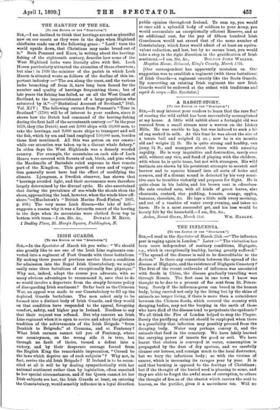THE HARVEST OF THE SEA..
[TO THE EDITOR OF THE " SPECTATOR."]
Si; —I am inclined to think that herrings are not so plentiful now on our coasts as they were in the days when Highland chieftains made use of the following grace : " Lord ! turn the world upside down, that Christians may make bread out of it." Both Pennant and Knox, in writing about the herring- fishing of the eighteenth century, describe bow some of the West Highland lochs were literally alive with fish. Loch Bourn particularly attracted the attention of these observers ; but alas 1 in 1836 the minister of the parish in which Loch Bourn is situated wrote as follows of the decline of this im- portant industry :—" The sea along the coast, and the various lochs branching off from it, have long been famed for the number and quality of herrings frequenting them ; but of late years the fishing has failed, as on all the West Coast of Scotland, to the impoverishment of a large population who subsisted by it."—(" Statistical Account of Scotland," 1845, VoL XIV.) The following extract from Pennant's "Tour in Scotland" (1790) will be of interest to your readers, since it shows how the Dutch had command of the herring-fishing during the first half of the seventeenth century :—" In the year 1618, they (the Dutch) sent out 3,000 ships with 50,000 men, to take the herrings, and 9,000 more ships to transport and sell the fish, which by sea and land employed 150,000 men, besides those first mentioned. All this was gotten on our coasts while our attention was taken up in a distant whale fishery." In olden days the West Highlands was a densely wooded country. For example, the mountains on each side of Loch Bourn were covered with forests of oak, birch, and pine when the Macdonells of Barisdale ruled supreme in that remote part of the Kingdom. This growth of trees and of vegeta- tion generally must have had the effect of modifying the climate. Ljungman, a Swedish observer, has shown that "herrings avoided light, and their movements were therefore largely determined by the diurnal cycle. He also ascertained that during the prevalence of sea-winds the shoals shun the shore, approaching the land, however, when the winds blow off- shore."—(Maclntosh's " British Marine Food-Fishes," 1897, p. 409.) The very name Loch Bourn—the lake of hell— suggests a reason why it was a favourite resort of the herring in the days when its mountains were clothed from top to






































 Previous page
Previous page